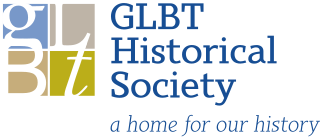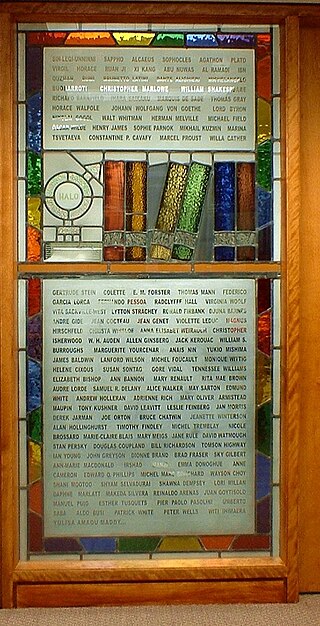PFLAG is the United States' largest organization dedicated to supporting, educating, and advocating for lesbian, gay, bisexual, transgender, and queer (LGBTQ+) people and those who love them. PFLAG National is the national organization, which provides support to the PFLAG network of local chapters. PFLAG has nearly 400 chapters across the United States, with more than 350,000 members and supporters.
A straight ally, heterosexual ally, or cis ally is a heterosexual and cisgender person who supports equal civil rights, gender equality, and LGBTQ+ social movements. Individuals may meet this designation through their actions without actively identifying as an ally.

LGBTQ culture is a culture shared by lesbian, gay, bisexual, transgender, and queer individuals. It is sometimes referred to as queer culture, while the term gay culture may be used to mean either "LGBT culture" or homosexual culture specifically.

Israel Gay Youth (IGY) was founded in 2001 in Israel as a non-profit NGO, branching off from the Israeli Gay, Lesbian, Bisexual and Transgender Association.
Outfest is an LGBTQ-oriented nonprofit that produces two film festivals, operates a movie streaming platform, and runs educational services for filmmakers in Los Angeles. Outfest is one of the key partners, alongside the Frameline Film Festival, the New York Lesbian, Gay, Bisexual, & Transgender Film Festival, and the Inside Out Film and Video Festival, in launching the North American Queer Festival Alliance, an initiative to further publicize and promote LGBT film.

The Frameline Film Festival began as a storefront event in 1976. The first film festival, named the Gay Film Festival of Super-8 Films, was held in 1977. The festival is organized by Frameline, a nonprofit media arts organization whose mission statement is "to change the world through the power of queer cinema". It is the oldest LGBTQ+ film festival in the world.

LGBT movements in the United States comprise an interwoven history of lesbian, gay, bisexual, transgender and allied social movements in the United States of America, beginning in the early 20th century. A commonly stated goal among these movements is social equality for LGBT people. Some have also focused on building LGBT communities or worked towards liberation for the broader society from biphobia, homophobia, and transphobia. LGBT movements organized today are made up of a wide range of political activism and cultural activity, including lobbying, street marches, social groups, media, art, and research. Sociologist Mary Bernstein writes: "For the lesbian and gay movement, then, cultural goals include challenging dominant constructions of masculinity and femininity, homophobia, and the primacy of the gendered heterosexual nuclear family (heteronormativity). Political goals include changing laws and policies in order to gain new rights, benefits, and protections from harm." Bernstein emphasizes that activists seek both types of goals in both the civil and political spheres.
Family Equality is a national American nonprofit organization whose mission is to advance legal and lived equality for lesbian, gay, bisexual, transgender and queer (LGBTQ) families, and for those who wish to form them, through building community, changing hearts and minds, and driving policy change.

The GLBT Historical Society maintains an extensive collection of archival materials, artifacts and graphic arts relating to the history of LGBTQ people in the United States, with a focus on the LGBT communities of San Francisco and Northern California.

The Houston GLBT Community Center was a community center for gay, lesbian, bisexual, and transgender people and their allies in the Houston metropolitan area and southeast Texas. Its last location was in the Dow School building in the Sixth Ward of Houston.
Sally Huffer is an American LGBT activist that resides in Houston.
Youth pride, an extension of the Gay pride and LGBT social movements, promotes equality amongst young members of the Lesbian, Gay, Bisexual, Transgender, Intersex, and Queer (LGBTIQ+) community. The movement exists in many countries and focuses mainly on festivals and parades, enabling many LGBTIQ+ youth to network, communicate, and celebrate their gender and sexual identities.

Lesbian, Gay, Bisexual, Transgender, and Queer Aggies is an officially recognized student group at Texas A&M University. Originally known as Gay Student Services (GSS) and later as Gay, Lesbian, Bisexual, and Transgender Aggies, the organization was officially recognized by Texas A&M University in 1985 after a lengthy court battle.
Arlene Istar Lev is a North American clinical social worker, family therapist, and educator. She is an independent scholar, who has lectured internationally on topics related to sexual orientation and gender identity, sexuality, and LGBTQ families.

In the post-Stonewall era, the role of libraries in providing information and services to LGBTQ individuals has been a topic of discussion among library professionals. Libraries can often play an important role for LGBTQ individuals looking to find information about coming out, health, and family topics, as well as leisure reading. In the past 50 years, advocate organizations for LGBTQ content in libraries have emerged, and numerous theorists have discussed various aspects of LGBTQ library service including privacy concerns, programming, collection development considerations and librarian/staff education needs, as well as special services for juvenile and teen patrons.
The city of Shanghai, China, a global center for finance, technology, manufacturing, and transportation, has a presence of LGBT people.
This is a timeline of notable events in the history of non-heterosexual conforming people of Asian and Pacific Islander ancestry, who may identify as LGBTIQGNC, men who have sex with men, or related culturally-specific identities. This timeline includes events both in Asia and the Pacific Islands and in the global Asian and Pacific Islander diaspora, as the histories are very deeply linked. Please note: this is a very incomplete timeline, notably lacking LGBTQ-specific items from the 1800s to 1970s, and should not be used as a research resource until additional material is added.

LGBT ageing addresses issues and concerns related to the ageing of lesbian, gay, bisexual and transgender (LGBT) people. Older LGBT people are marginalised by: a) younger LGBT people, because of ageism; and b) by older age social networks because of homophobia, biphobia, transphobia, heteronormativity, heterosexism, prejudice and discrimination towards LGBT people.








